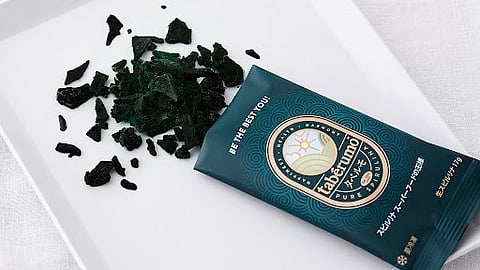
- Home
- EventsEvents
- Product Launches
- CategoriesCategories
- Advertise
- Opinion

CHITOSE Group is a family of biotechnology companies operating mainly in Southeast Asia and Japan to leave mankind with an environment where they can live in abundance for over a thousand years. CHITOSE Laboratory Corp. is a part of the CHITOSE group, taking part in business and research development. The organization is creating new values in the fields of agriculture, medicine, food, energy, chemistry, and others through “Technological development capabilities in the biotechnology field by constantly promoting economic rationality” and “Business development capabilities for drawing a path towards commercialization by understanding the essence and limitations of biotechnology.”
Dr. Tomohiro Fujita, founder, CHITOSE, explained the company’s structure and said, “Chitose Laboratory Corp. started a new business related to microorganisms in 2009. We have established CHITOSE BIO EVOLUTION in Singapore to oversee CHITOSE’s subsidiary companies. CHITOSE Group has been putting significant effort into research and development to enrich the next thousand years with the power of small organisms in the world. Our research and development have fostered several businesses and various kinds of projects.”
Building a decarbonized society through the MATSURI project
Photosynthesis is a process indispensable for future business activities and photosynthesis by algae is the most promising way to produce substances using solar energy. Explaining the role of microalgae in achieving a decarbonized society, MATSURI’s spokesperson, Toshihiko Namikawa, said, “Microalgae can produce various materials via photosynthesis to replace fossil fuels. Furthermore, microalgae require CO2 to grow themselves via photosynthesis. Therefore, they can prevent CO2 emission which is considered a cause of global warming. We believe that building the industry based on microalgae is the best solution to achieve decarbonization.”
Keeping this in mind, CHITOSE and MATSURI partners band together to co-create the system to fully utilize every component of microalgae biomass such as lipids, protein, and carbohydrates. These components can be the sustainable alternative to raw materials of daily necessities including fuel, plastics, cosmetics, food, and feed.
Namikawa described the importance of the project and said, “CHITOSE launched the MATSURI project to enable a carbon-neutral society and industry, together with leading companies in the industry, government, and organizations. This project aims at structuring a new industry based on microalgae and the first joint project in the microalgae-related business. We have been receiving high expectations.”
On a mission to build a photosynthesis-based circular society
CHITOSE Groups is on a mission to make every industry enrich the next thousand years by progressing from a fossil-dependent society to a biomass and photosynthesis-based circular society, by utilizing the natural abilities of small organisms. Sharing the steps taken in this direction, Namikawa said, “Photosynthesis is the only method to convert sunlight energy into a new substance. We are expanding our business to foresee the next thousand years, and putting significant effort into research and development and commercial-scale culturing.”
Food safety at the production facility
tabérumo (Raw spirulina) has a production facility in Brunei. For food safety measures, the production process follows Japanese safety standards. Namikawa informed us, “We employ HACCP (Hazard Analysis and Critical Control Point), quality standards at the time of shipping are satisfied with Japanese food safety standards. We have acquired the Halal certificate. We also believe that our safety measures in production contribute to decarbonization.”
tabérumo by CHITOSE at Gulfood 2023
CHITOSE Group will be participating in the upcoming Gulfood event to be held at the Dubai World Trade Centre from 20-24 February 2023. At the largest F&B sourcing event in the world, the company will feature its product tabérumo (Raw spirulina). tabérumo is a part of the MATSURI project, which is the world's first joint project to develop a new industry based on microalgae.
According to Namikawa, the benefit of CHITOSE’s tabérumo is raw spirulina that, unlike other dried Spirulina products, does not go through thermal processing. He added, “It can provide its signature nutrients (60 different nutrients!) without being thermally destroyed. This is only possible with our technologies; cultivation technology that can grow them on a large scale without contamination, and our patented unique technology that allows Spirulina to be flash-freezed.”
At Gulfood, CHITOSE is expecting that more people will recognize the importance of microalgae as the next resource to come. It is also looking for new partners and investors to join and invest in the MATSURI project, especially from the food perspective.
At the event, CHITOSE will be introducing the MATSURI project to provide photosynthesis-based solutions. Aiko Hayashi, a project member of MATSURI is attending Gulfood and invited visitors to their booth and said, “We have food-related products and projects including the MATSURI project that everyone in the world would like to support. We strongly believe that your support will lead to enrich your life and solve global challenges. Please come to our booth to experience our product and what we are going to achieve!”
Insights into the future
CHITOSE firmly believes that algae biomass is a better alternative to using finite fossil resources to produce various products. Algae play a crucial role in saving our planet, which is challenged by several environmental issues today. Therefore, according to Fujita, CHITOSE’S vision is to convert all industries to be photosynthesis based. He added, “We would like to convert the desert to microalgal farms and utilize harvested microalgae to replace conventional fuel and oil. Furthermore, we continue to challenge global challenges by providing innovations.”
CHITOSE is completing the 5ha demonstration plant in Malaysia which is the biggest utilizing PBR (PhotoBioReactor) method in the world. Fujita remarked, “We see this 5-ha demonstration plant as one of our checkpoints. We are aiming at expanding our plant to 2000 ha in 2030, 10 million ha in 2050," he signed off.
Click HERE to subscribe to our FREE Weekly Newsletter
